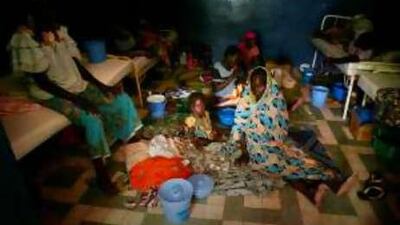NEW YORK // Saudi Arabia's senior UN official has warned of the "life-shattering" consequences of fistula, a birth canal disorder, as the global body bolsters efforts to tackle the condition in the Arab world and beyond. Thoraya Ahmed Obaid, executive director of the UN Population Fund (UNFPA), described a devastating condition that afflicts at least two million women in the Arab world, Africa and Asia. As many as 100,000 new cases develop each year, with pregnant women suffering a tear in the birth canal during prolonged labour that is not treated quickly, according to UN reports. "The consequences of fistula are life-shattering," Ms Obaid said. "The baby often dies and the woman is left with chronic incontinence, greatly diminishing her prospects for work and family life." The UNFPA launched a global Campaign to End Fistula aimed at eliminating the condition by 2015 and has supported the treatment of more than 7,800 women across 45 countries. The campaign last year saw US$34.3 million (Dh126m) spent in the Arab world with operations from Morocco to Oman, according to a report published on Monday. Funding is concentrated in regions including Iraq, the Palestinian Territories, Syria and Sudan. Natalie Imbruglia, the Australian singer of the pop song Torn, has thrown her weight behind the campaign by visiting Katsina state in Nigeria in December to shine a spotlight on the projects being undertaken in Africa. The latest fistula report from the office of Ban Ki-moon, the UN secretary general, said doctors can repair damage in more than 85 per cent of cases. But only an estimated 7,000 women receive such treatment each year, or "just 10 per cent of new cases and barely touching the backlog of two million women or more", the report warns. The 20-page document describes a "devastating childbirth injury" that renders victims "incontinent, ashamed and often isolated", disproportionately blighting poor women from rural parts of the developing world. Obstructed labour globally occurs in almost five per cent of deliveries, with pressure from babies' heads damaging the birth canal and threatening lasting damage. In serious cases where treatment is unavailable, this can cause a hole, or obstetric fistula. "Women living with obstetric fistula have typically survived three days of labour and some longer than a week. In as many as 90 per cent of cases, the baby is stillborn or dies within the first week of life," the report said. Sufferers experience bladder infections, sores, kidney failure and infertility as well as the social stigma stemming from incontinence. "Many women are abandoned by their husbands," the report said, adding that cases can result in "depression, low self-esteem and, in some cases, suicide". Awatif Altayib Mohammed, a midwifery graduate from West Darfur, Sudan, is well acquainted with the horrors of fistula, having endured the condition for nine years after an agonising childbirth at the age of 16. After two days of labour, Ms Mohammed's husband took her to the nearest hospital in a town called Furbaranga - a four-hour drive through desert terrain that her baby did not survive. "After seven days at the hospital, I felt severe pain and paralysis in my right leg. I knew there was something wrong with my urine," Ms Mohammed said. "At that time, I had no idea about fistula." The victim's family sold their cattle to pay for an operation that failed to repair the damage. A second attempt to receive treatment in the city of Nyala ended in disaster when the group's vehicle was hijacked at gunpoint and their possessions stolen. Ms Mohammed's husband started leaving home for long periods and eventually stopped returning altogether - because of the fistula, she said. Her condition was only treated in May last year thanks to a project supported by the UNFPA. The condition is almost non-existent in countries where expectant mothers have access to midwives and emergency obstetric care. Lower rates are also found when women exercise control over how many children they have. The secretary general's report describes "great progress" being made in the battle against fistula in the Arab world, although health chiefs remain extremely concerned about the situation in Sudan, Somalia, Djibouti and Yemen. Although the campaign to end fistula has widened its net four-fold from the original 12 countries it served upon creation in 2003, it remains unclear whether the $750m requested this year to continue treatments will be available. jreinl@thenational.ae

UN bolsters drive to end peril of childbirth
Saudi Arabia's senior UN official has warned of fistula, a birth canal disorder, as the global body bolsters efforts to tackle the condition in the Arab world and beyond.
Most popular today

